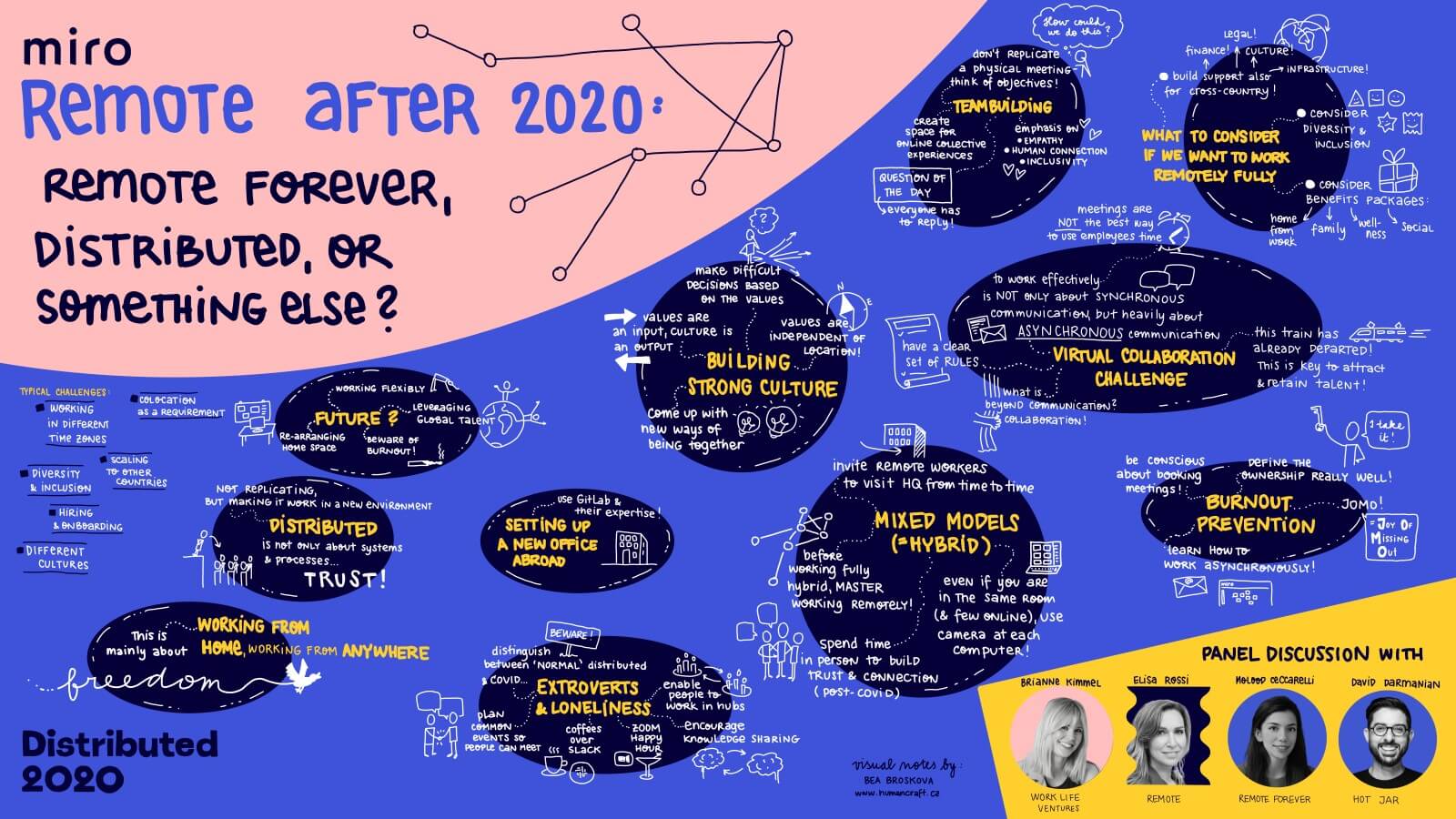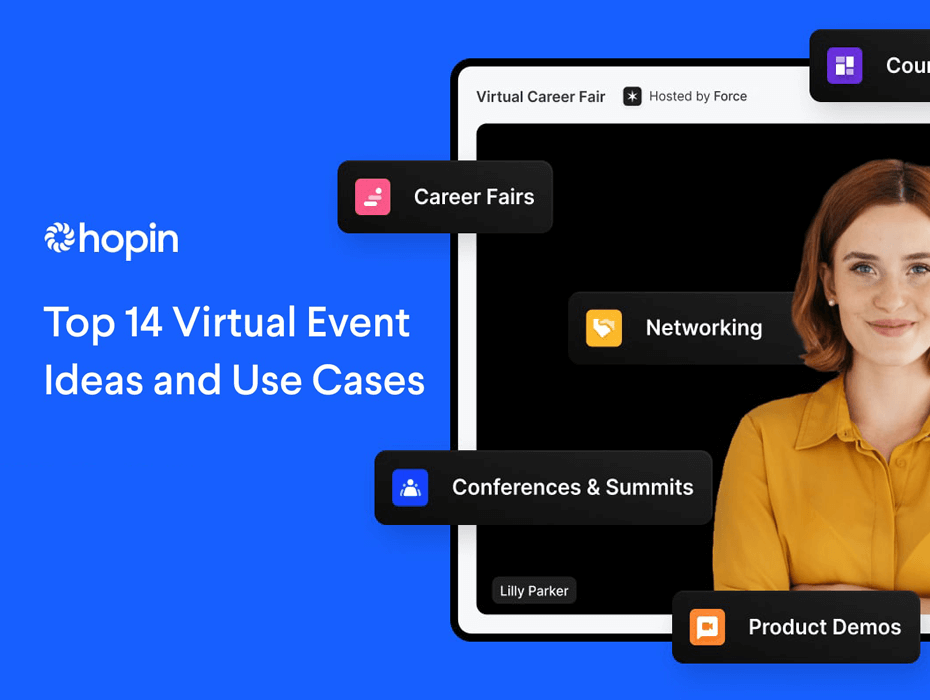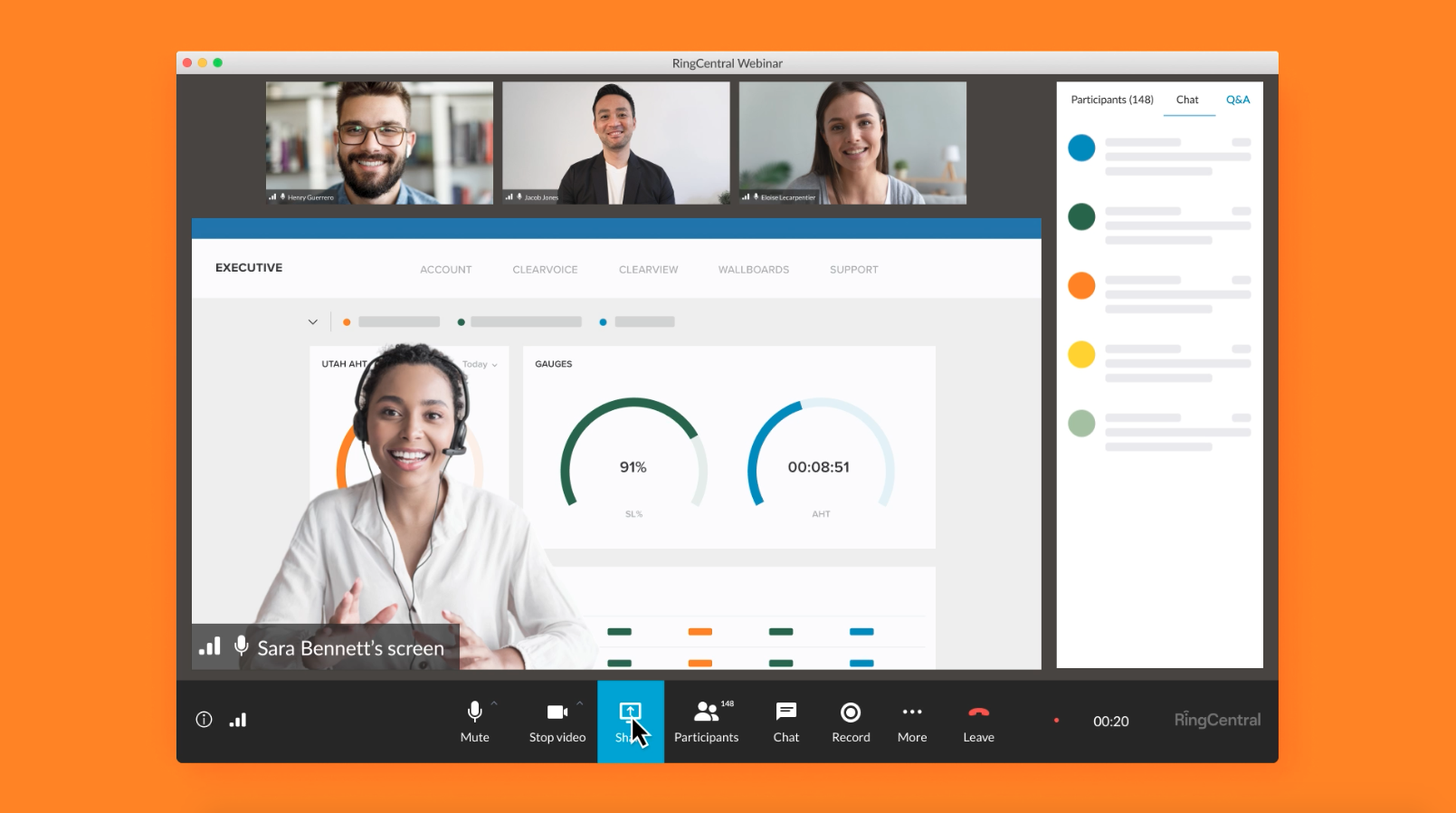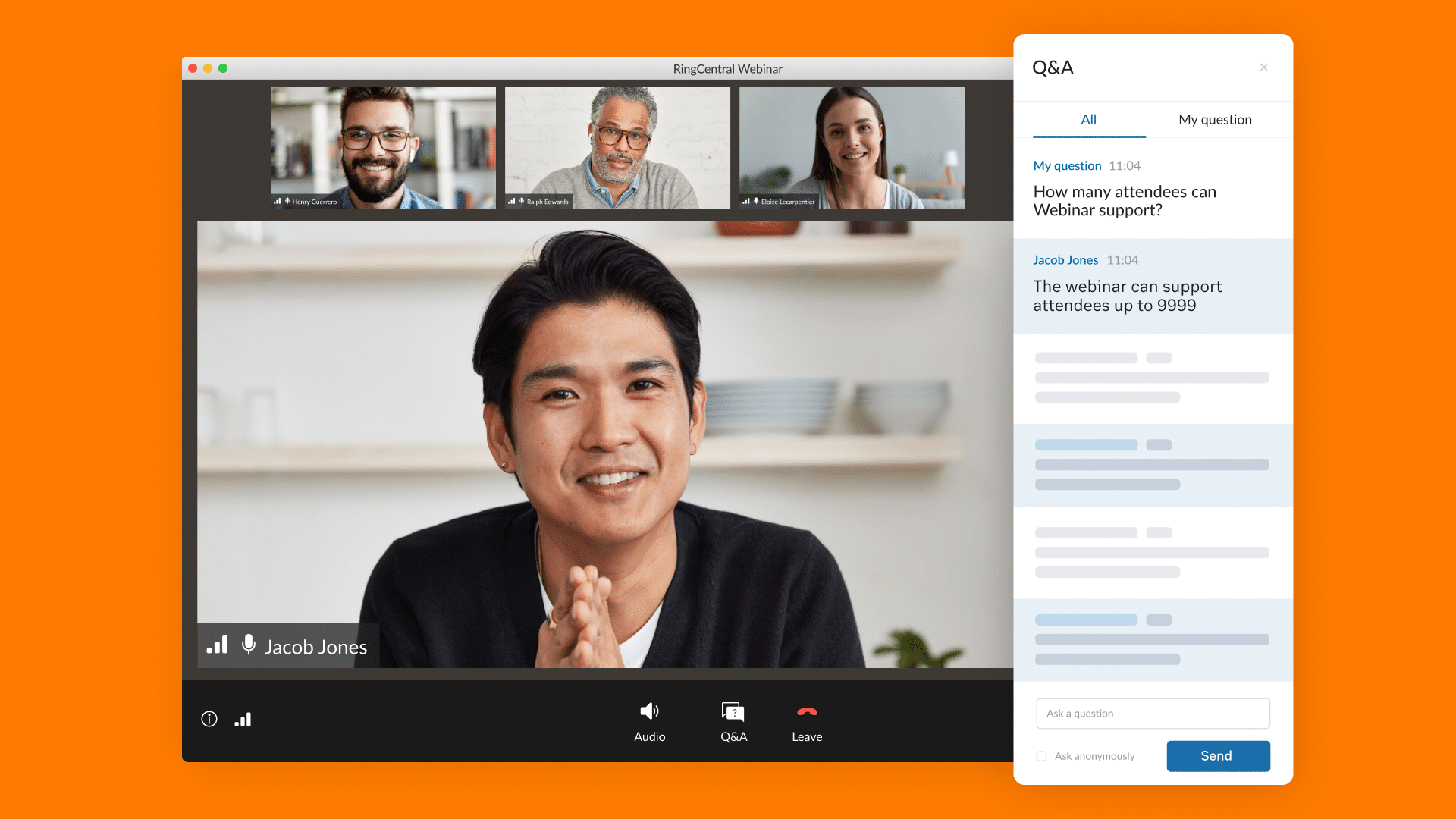The current boom in virtual events is a product of their versatility.
Over the past year, organizations across industries—and teams across organizations—have turned to virtual events as a way to bring people together and create community.
And for good reason. Online events are easier to scale because they remove physical barriers. They are more accessible, welcoming audiences from anywhere in the world. They are also cost-effective, increasing the opportunities to host events.
As the future of work and life takes shape, virtual events will continue to be a vital way for people to gather and connect.
In this article, we discuss how you can use online events in different industries as well as for various functional teams. You will find real-world examples of successful online events and actionable insights to help you improve your own virtual event strategy.
Let’s jump in.
14 use cases for online events, plus actionable takeaways
There are two ways to think about virtual events: by industry and by function.
If you’re creating a company-wide marketing strategy, looking at the event types that are already standard for your industry is a good starting point.
However, if you are focused on events for one specific department, we recommend diving deeper into the function section.
Exploring both will give you a better understanding of what types of events your audience expects you to host and which of those are best suited for your goals.
Industry
In this section, we explore seven industries and the event types that perform well for each.
While there are many event types that are suitable for each category, we concentrate on those that brands have produced in recent months. The examples below are an excellent starting point, but you should experiment with other ideas as well.
For industry verticals not included here, use the examples and insights in this section to help brainstorm virtual event ideas that align to your particular goals.
1. Internet, tech, and software
Online events for the internet, tech, and software industry generally fall in two buckets: thought leadership and product education.
The goals of these events are to establish brand authority in a given subject area as well as to help customers better understand and use a brand’s tools.
The most common types of virtual events for this vertical include:
- Conferences
- Summits
- Webinars
- Trainings and workshops
- Networking events

For example, the online collaborative whiteboard platform Miro hosted a virtual conference called Distributed 2020, which went above and beyond the typical online meeting thanks to digital reception areas, keynote speaker stages, and one-on-one video networking.
Through the event, Miro was able to demonstrate its thought leadership around workplace collaboration—while also showcasing its product within the event itself, via an integration with the RingCentral Events platform.
The event saw 30,000 registrations, 15,000+ attendees, and an average session audience of 1,300-3,000 people.
Takeaway: Online events give brands an opportunity to shine, especially in this industry. Try to find an event hosting software that can integrate with your tool, so you can show your product in action.
2. Media
Media brands use online event marketing to increase audience engagement, drive website traffic, and increase the volume of their marketing touch points.
Consider adding these online event ideas to your media company’s marketing playbook:
- Conferences
- Festivals
- Panel discussions
- Interviews and fireside chats
- Expos
In 2020, news outlet The Wall Street Journal hosted a virtual installment of its annual WSJ Health Forum.
In addition to interviews with healthcare experts and policymakers, WSJ programmed interactive sessions, including virtual “lunch table” Q&A and one-on-one video networking for its 900+ attendees.
Takeaway: Media brands often have a one-way relationship with their audiences: You create, they consume. But virtual events that prioritize audience participation can grow engagement with and loyalty to your brand.
3. IGOs, NGOs, and nonprofits
Not-for-profit organizations use online events to educate and inspire, as well as raise funds for target causes. Their goal is often to build awareness and nurture community among a broad group of stakeholders.
Important online events for IGOs, NGOs, and nonprofits include:
- Conferences
- Association meetings
- Fundraisers
- Galas
The United Nations hosted the UN Global Compact Leaders Summit, an international virtual conference. The 26-hour event included 50 breakout sessions with 500+ speakers, 21 United Nations Partners, and 26 conference-wide sub-events.
With over 15,000 guests and 185 countries represented, the event was a success—thanks largely to how the team created a central, online destination for all participants, from which different groups were then able to branch out for separate sessions.
Takeaway: Online events allow NGOs to reach a broader, more geographically distributed audience—which is a powerful lever for community building and fundraising. To make the most of that reach, be sure to create programs that resonate with all parts of a diverse audience, including common content for all attendees and specialized content for particular interest groups.
4. Consumer goods
Retail brands with traditional brick-and-mortar and/or ecommerce stores host virtual events that help them drive awareness, desire, and sales.
Whether it’s a cash-prize competition or a Q&A on the latest trends, these events often prioritize entertainment value and are generally reflective of a brand’s personality.
Some of the most popular online event types for consumer goods brands include:
- Product launches and product reveals
- Contests
- Conversations with influencer partners
- Q&A

Consumer goods giant Unilever knows that retail pop-ups are a powerful way to grab attention and generate interest—which is why it hosted a virtual pop-up for its SheaMoisture product during the pandemic.
The online event featured yoga sessions, cooking segments, live music, celebrity panels, and a number of activities that it generally would not be able to program in one physical space at the same time.
One of Unilever’s main goals besides customer engagement was to capture audience data around product preferences. They were able to gather those insights for each of its virtual attendees because it used an online event platform.
An unsung advantage of virtual event platforms like RingCentral Events is the analytics they provide on how audience members engage with event content. These target audience insights can help optimize future events—as well as inform future marketing and overall business efforts.
Takeaway: Consumer goods brands thrive on understanding the specific product preferences of their audiences. Partner with an online event platform that offers detailed analytics to make the most of your virtual gathering.
5. Education
In the education space, idea and information sharing are central to the online events that organizations host.
These events encompass instruction, marketing, and recruitment, for audiences including current and prospective students, academic faculty, and administrative staff.
The top education industry ideas for virtual events include:
- Virtual classes and tutoring
- Virtual office hours
- College and career fairs
- Prospective student recruitment
- Admissions department marketing
- Orientations
- Facility tours
- Ceremonies such as commencements and graduations
- Conferences for faculty and researchers
- Thought leadership and brand building events
- Guest speaker series
Ravensbourne University London, a digital media and design school, hosted a virtual version of its annual one-week, 15-credit course.
Organized like a conference, the course featured 60+ educational sessions with design competitions, live streams, even sessions for socializing. In selecting an online platform, Ravensbourne prioritized ease of use in order to ensure the effectiveness and accessibility of its online instruction.
Takeaway: Accessibility and engagement are critical for any online event, but especially so for education. Carefully consider your students’ available resources and specific learning needs when selecting an online platform to host a course.
6. Sports and entertainment
Entertainment events are, by definition, experiential. Oftentimes, the event itself is the end product; however, entertainment events can also serve brand marketing, promotional, and/or fan engagement goals.
In sports and entertainment, online event types include:
- Festivals
- Concerts
- Watch parties
- Movie screenings
- Virtual games and activities
- Contests
- Community and philanthropic initiatives
The New York Jets used online events to support local high school athletes as part of a campaign to end bullying. Through a virtual meet and greet, NFL players spoke with student athletes on topics like college recruitment, how to do press, and the value of sports.
Takeaway: Use virtual event platforms to open up opportunities for engagement between fans and the brands, teams, and/or individuals they are cheering on. Also find ways to build online community among fans by enabling them to interact with each other around key brand moments.
7. Professional services
If you offer custom knowledge- and coaching-based services, online events provide opportunities for brand building and lead generation. These events often involve education, demonstrations, and skills development.
Professional service brands and consultants can benefit from the following virtual event ideas:
- Panel discussions
- Workshops
- Trainings
- Courses
Treehouse, an online school offering technology courses at all skill levels, set out to create a festival that would be both educational and on-brand as it switched over to an entirely virtual business model.
Dubbed the Treehouse Festival, the five-day gathering featured a variety of sessions, including fireside chats and interactive Q&A. The event saw attendance rates of 46%, well above the 10% Treehouse anticipated.
In addition to higher than expected participation, Treehouse also sourced over 2,000 new ideas for future courses and events through polls and audience feedback.
Takeaway: Even as it provided instruction, Treehouse made sure to ask its audience for input on how to develop the Treehouse community and service offering. Not only did this give participants a sense of ownership over the community, it also provided Treehouse with vital ideas for future service development. Polls, surveys, and other guest engagement features on your online event management platform can help surface feedback from attendees.
Function
In this section, we explore seven job functions and the event ideas best suited for each.
Different functional teams play different roles within an organization, and each has its own specific goals and requirements for events. The examples here show how various teams can use virtual events.
For functional areas not discussed, use the insights below to brainstorm online event ideas that meet your particular needs.
8. Marketing
Online events for marketing cover every stage of the buyer’s journey, from creating awareness, to facilitating consideration, to driving sales, and beyond.
Some event types are useful for all marketing teams, whereas others may be better-suited to specific verticals.
Virtual events that support marketing goals include:
- Public conferences and summits
- Invite-only conferences
- Festivals
- Competitions
- Award shows
- Product demos and launches
- Webinars
- Thought leadership events
- Expos and trade shows
The Atlantic’s marquee festival brought in over 37,000 online attendees. Its goal? Produce an engaging event anchored by vital cultural conversations in order to showcase the Atlantic as a preeminent media brand.
Using RingCentral Events’ virtual event platform, the team created a seamless online event for its global audience and programmed interactive modules—via video Q&A and networking—to bridge the geographic, presenter-speaker, and IRL-online divides.
Takeaway: Online events should not be a one-way street. Instead, promote dialogue and active participation from your audience in order to deepen their engagement with your content and brand, and to source crucial feedback and ideas.
9. Sales
Online events for sales departments help create more opportunities to source and convert leads through educational and interactive offerings.
A key advantage of using online events for sales is scale—the ability to engage a large number of prospects or customers at one time.
The best types of online events for sales include:
- Live demos and tutorials
- Virtual expos
- Networking
It’s important to note that beyond driving consideration and conversion, online events can themselves be a source of revenue. For instance, the ExO World Summit, a fully online event, generated over $150,000 in ticket sales.
Takeaway: As with marketing events, sales events are most effective when there is interaction between brand/presenters and the audience. Online events give sales reps an opportunity to show your product or service in action. But, just as important, they are also a way to answer questions and address objections on the spot.
10. Internal communications
Internal communication teams host online events for collaboration, onboarding and training, continuing education, celebrations, and more.
Though they are meant for employees, these events require as much thought and planning as customer-facing ones—since employee engagement and effectiveness is a central factor in an organization’s success.
Online events are a way to keep employees involved and to get them to share their ideas, feedback, and questions.
Common online events that support internal communications include:
- New hire onboarding
- Training
- Workshops and continuing education
- Quarterly kickoffs, including sales kickoffs
- Team socials like happy hours and holiday parties
Internal communications events like GitLab’s multi-day internal conference are a way to discuss company and team objectives, take stock of performance, share vital information, build camaraderie and rapport, and so on.
As a fully remote company (and the world’s largest remote company), GitLab programmed content across time zones, so all team members could participate during normal working hours. They concluded the event with a themed party.
Takeaway: No matter your event focus, team relationship building is an important component of all internal events—especially online events. Be sure to include opportunities for socializing, such happy hours, games, and/or one-on-one networking.
11. Recruitment
Recruitment events are designed to attract and inform top talent and to build your employer brand.
These can be thought leadership events featuring members of your company, informative events that showcase employee experience, or networking events.
Popular options for online recruitment events include:
- Career fairs
- Networking events
- Interview events
- Panels
HackerX is a recruitment event for developers in Silicon Valley. At an online version of the recurring event, dozens of companies hosted one-on-one interviews with job candidates and ultimately saw higher turnout rates and connections made than through its in-person events.
Takeaway: Online recruitment events allow you to reach more candidates in different geographies. Produce events that appeal to that broader audience—for example, by planning separate sessions for particular audience segments.
12. Education
For educators, online events are a way to provide instruction and engage students in real time.
An online event can provide a single destination for multiple sessions; it can support content including live and recorded video, screen-share, and interactive material; and it can offer a variety of ways to involve students, from Q&A to one-on-one instruction.
Here are key virtual event ideas for education:
- Online courses
- Tutoring
- Seminars
- Panels
- Office hours
The Hidden Genius Project hosted their annual Brothers Code event to train and mentor Black male youth in tech. The virtual event featured over 40 interactive workshops led by notable tech companies to provide hands-on skills training.
Crucially, because a section of the participants were young students, the event managers took steps to protect the privacy of their attendees—for instance, disabling the attendees’ front-facing web cameras to preserve their safety.
Takeaway: All events—but especially education events for young adults or children—should keep participant information safe, while preserving opportunities for engagement. Bring in dynamic presenters and give students opportunities and incentives to interact through chat features, polling, and giveaways.
13. Health and fitness
Online events for health and fitness encompass small- and large-scale exercise classes as well as cooking and nutrition courses. Like education events, these are generally live-streamed and participatory.
Some ideas for health and fitness events include:
- Virtual workout classes
- Seminars
- Workshops
The Culinary Institute provided a five-week series of virtual events that featured live cooking demonstrations and Q&A with chefs from around the world.
Event content included slideshows, polls and chat, and interactive breakout sessions in which participants were able to cook dishes alongside chefs.
Takeaway: The success of expert-led health and fitness events depend on the ability of attendees to directly participate in the activity. Consider how you can program sessions that allow for attendees to both join in and communicate back with instructors or session leaders in real time.
14. Community and social gatherings
Community and social gatherings are important building blocks of personal enrichment and long-term relationships.
Even if you can get together in person, you may find that virtual events for this function are a great way to make gatherings more accessible in ways that let you expand your community or group.
Online event types for community and social gatherings include:
- Live storytelling
- Book clubs
- Virtual concerts, plays, and other live performances
- Wellbeing activities
- Town hall meetings
- Weddings and birthday parties
QuarantineCon was conceived as an online community event for entrepreneurs and creatives, helping them connect, collaborate on projects, and find opportunities during the pandemic. The free event included speakers, entertainment, and networking, and attracted nearly 5,000 attendees.
Takeaway: Community and social gatherings make it easy to bring people together in a cost-efficient way while also broadening participation to people in different geographies who want to connect around a shared interest. Just be sure to pick an event platform that can accommodate larger crowds so your event can scale.
Conclusion: Aim for participation, not spectatorship
Virtual events have rapidly become an essential solution for many industries and job functions.
The ideas above showcase the broad utility and flexibility of online events as a way to reach and engage a distributed audience.
A recurring theme of all these examples is the importance of audience engagement. Unlike many other forms of brand communication, the advantage of events is their real-time nature. They provide an opportunity for a brand and and its audience to come together in a shared moment.
Rather than use that rare occasion to merely speak at attendees, consider ways to engage attendees in a dialogue—to transform audience spectatorship into active participation.
Not only does this make for a more interesting event, it has significant downstream benefits: providing tangible value to attendees through opportunities for networking, allowing you to glean insights directly from your audience, growing evangelism among your audience by providing greater access, and so on.
There are countless ideas for virtual events. But no matter the virtual event you host, always remember to create opportunities for your attendees to participate, so you can get the greatest benefit out of your event.
Originally published Sep 01, 2022, updated Nov 10, 2023





